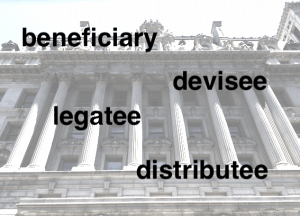Define Beneficiary of an Estate: What Is That?

A beneficiary of an estate is a person entitled to any part or all of an estate.[1]
What is a beneficiary? That’s a broad term, which combines a legatee and a devisee and sometimes distributee into one. A beneficiary has other connotations as well. In a trust, a beneficiary is someone who receives distributions from the trustee.
Here are the other three definitions you’d need to know to make sense of this:
- Distributee– a person entitled to take or share in the property of a decedent who died without a will.[2]
- Legatee– a person designated by a will to receive a transfer of personal property.[3]
- Devisee– a person designated by a will to receive a transfer of real property.[4]
These three terms apply to a will left by a decedent. These terms apply to those receiving vested property, as well as those who may have a future interest whether or not the future interest ever vests.
Legatee, devisee, distributee, and beneficiary seem like synonyms, but they are not. They have crucial distinctions. A difference in the four terms can mean the difference in
- whether you are getting valuable property from the estate,
- whether you have legal ability to contest the will and
- whether you are entitled to demand an accounting of the estate.
For example, a decedent bequests his house to Bob and his heirs, with the following condition: “as long as Bob is married, and if not to Cathy and her heirs”. Decedent also devises his art collection to Cathy and her heirs. In this example: Bob is a devisee because he received the house. Bob is also a beneficiary because all devisees are beneficiaries. Cathy is a legatee because she received the art collection—a is still single when the decedent died. And Cathy is also a devisee. She stands to inherit the property in case Bob is single; thus, she has what is known as an executory interest in the property. We consider Cathy a devisee even if she never gets the property because Bob stayed single. Consequently, Cathy is also a beneficiary.
New York’s estate law is complicated. The statutory application of estate distribution applies to a singular recipient or a class of types of recipients. Those complications are due to a combination of old common law terminology and modern definitions.
Understandably, this terminology can be hard to parse. It is always best to speak with a New York estate lawyer about your status and potential options. I am a New York estate, guardianship, wills, trust, Medicaid and probate lawyer with over a decade of experience. If you would like to speak to me, you can reach me at (212) 233-1233.
[2] SCPA 103(33) (McKinney 2018).
[5] In re Reape, 974 N.Y.S.2d 496 (2013).
